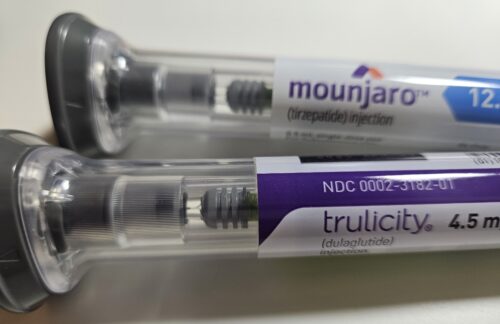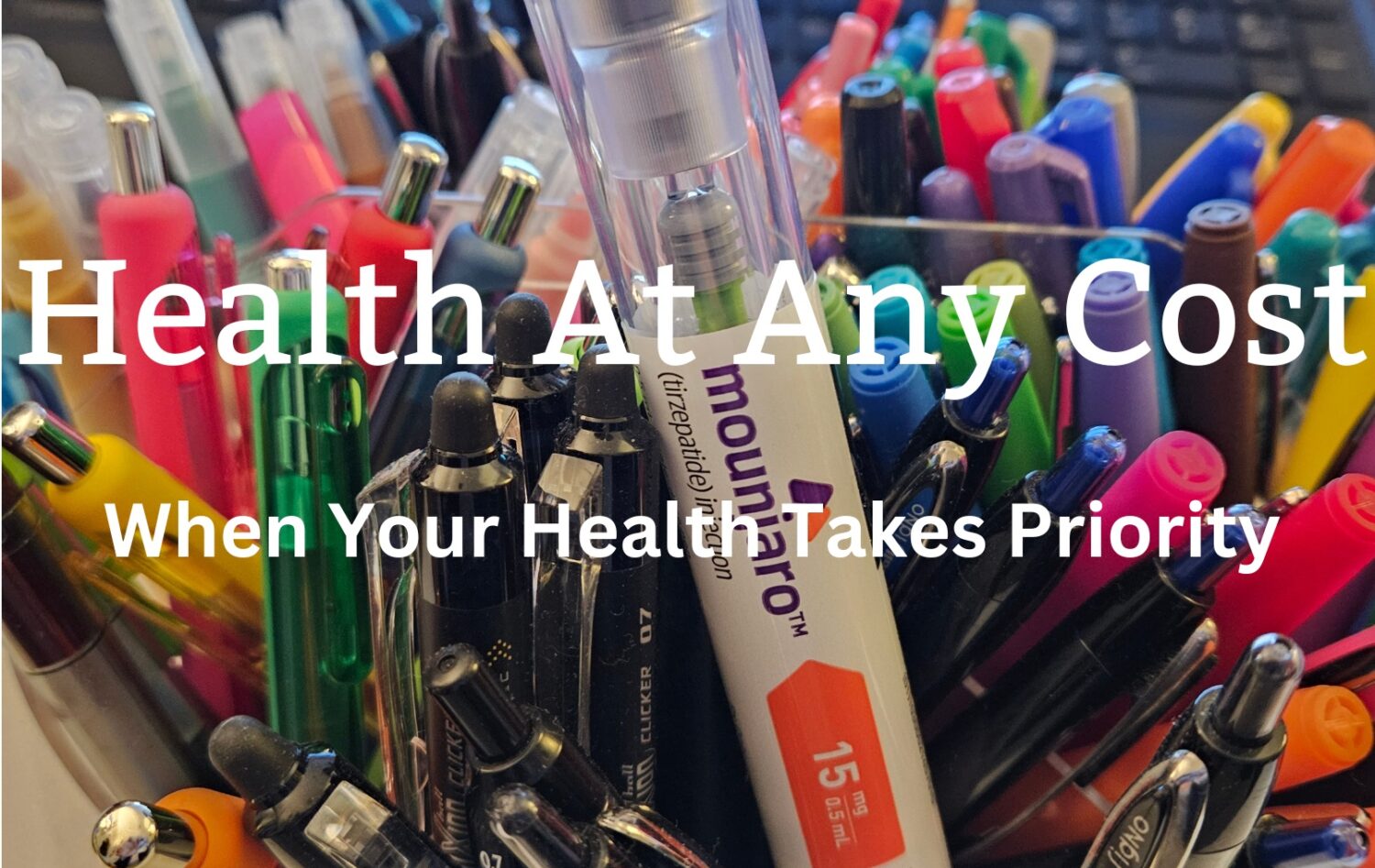In three weeks, I will have been on Mounjaro for a year. I was on Trulicity for a year before that. I have always had to do pre-authorizations, but that’s pretty typical for many of us using insurance for our GLP-1s. I’ve, obviously, always been approved.

That is until a few days ago when I got a notice in my texting and emailbox that my insurance denied me my Mounjaro. Confused, the doctor and I spoke (through her nurse) and she resubmitted my pre-authorization request for Mounjaro, making sure to include that I have Chronic Kidney Disease 3a and a history of Diastolic Heart Failure.
Once again, I was denied coverage for Mounjaro.
Having a Chat with the Insurance Company
This is always so much fun, you know. Call this number, press that number, press another one, and another. That phone tree goes on for centuries until there is finally an option to “Speak to a representative.” Ugh, how I hate not talking to real people on the phone anymore. (Don’t I sound so old saying that?)
I got through to a person who spent time listening to why I was calling, tried to tell me what the records said and then abruptly told me, “You need to talk to the Pharmacy people.”
With a click, she was gone and another phone hold kept me hearing crap music for another twenty minutes before “the Pharmacy” got on the phone.
I explained the issue again and more virtual rifling through paperwork until I finally heard, “Ahhh, this is the problem.”
“Hey, Lady. You Have to Start All Over.”
“You will need to try two different medications for six months each to show that they did not work for you before you can be moved up to Mounjaro.”
Picture me, sitting at my desk, eyes squinting in confusion, and my mouth slowly opening to try and ask what kind of bullshit this is considering I have been on this medication for a year and now they want me to start all over again? I breathed in deeply so I didn’t cuss at the lowly peon that had to talk to real people for a job and not just the computer screen like the luckier folks. It wasn’t that exact person that made this decision. At least I was pretty sure he was just the messenger.
“I was on Trulicity for a year and that did not work the way it needed to to get my diabetes under control. That was why I was put on Mounjaro.”
He said, “I understand that, but you will need to show us that you have tried something like Saxenda for six months and then Trulicity for another six months and show they are not working before moving up to another medication like Mounjaro.”
I knew immediately that logic wasn’t going to have any place in this discussion, but pressed on anyway.
Me: “As I said, I took Trulicity for a year. I have to try something that didn’t work again? For six more months?”
He says, “Oh, well, you could start with Ozempic since you already tried Trulicity.”
You know how sometimes when you talk to bureaucrats you can hear them reading from a script? This was not that kind of time. This was someone who seemed to be throwing cooked spaghetti at the wall and seeing which ones would stick.
I continued, “So you’re telling me that I have been on the highest dose of Mounjaro for seven months, my labs are perfect, my diabetes is under control, I have lost 245 lbs. and now you want me to start on the lowest dosage of Ozempic and “try this” because of paperwork?!?
The Unethical Process of Pre-Authorization
In “Insurers’ Rules and AI for Preauthorization: “Ethically Nuts,” Says Ethicist,” Arthur L. Caplan, PhD opines about how absurd pre-authorization is because it overrules, and undermines, what the physician and care provider believe to be the most beneficial medication, procedure, or service is for the patient.
We now have more evidence about what really is going on. A doctor was recently interviewed by ProPublica and said that she had worked for Cigna as a reviewer. Basically, the message she got from that insurer was to speed it up, go fast, and basically “deny, deny, deny” when she got requests. Those are her words, not mine.
NOTE: Please read the ProPublica article,
“A Doctor at Cigna Said Her Bosses Pressured Her to Review Patients’ Cases Too Quickly.
Cigna Threatened to Fire Her.”
It makes my stomach turn reading the lies that insurance company Cigna is
(and certainly all the rest are) perpetuating.
As if all of that news isn’t disturbing enough, Dr. Caplan says (some?) insurance companies are bringing in, or have already brought in, AI to do the approvals or denials of pre-authorizations.
Artificial Intelligence, people. A program to decide the fate of real life people who need kindness and compassion to serve their medical needs.
Looming up now, some insurers are starting to think, well, maybe artificial intelligence could do it. Just review the written request, trigger certain responses on the part of the artificial intelligence — it can deny the claims just as well as a human — and maybe it’s even cheaper to set up that system for the insurer.
I want to vomit.
Beginning My Appeal
I wrote, what I not-so-humbly, consider an eloquent letter, stating my case for continued use of Mounjaro. I started with the financial reasons, which, I was sure, is what is behind all of this in the grand heirarchy of bureaucracy. I laid out the number of medications I was able to stop because of being on Mounjaro, including insulin, my heart medications, and more.
Continuing, I outlined the health reasons I feel the decision should be re-evaluated. I laid out the number of weight loss tries I had done in my life, including that my diabetes had begun in 1995 and this was the first thing that has ever worked for this long.
It was necessary, of course, to mention weight loss as well. I couched the health benefits and fantastic labs with how much weight loss had to do with it all. I was out of bed, for goodness sake. That, in and of itself, was a miracle. Without losing 245+ pounds, none of these improvements would have happened.
Lastly, I named clinical studies that proved tizepatide was superior to semaglutide for significantly improving HbA1c, just in case they needed to look it up.
I’m not sure any of this will do anything, but I will fight this. If this first appeal fails, there is one more appeal avenue I can take… and I will most assuredly do that. I don’t know how long all of this will take, but I am, if nothing else, persistant.
What Happens with My Mounjaro in the Meantime?
I have asked that they continue the Mounjaro prescriptions during the appeal process. That was an option, but one had to specifically ask for that to happen. I was told to call a number and someone would call me back, but no call has been forthcoming. If I did not ask for the continuation of the service, they would not give it. I put the request for continuation in bold letters at the top of the statement I created.
Getting Another Set of Eyes
I sent my letter to Laraine and Christopher Durham of the DownSized YouTube channel and website to look over it. They are both executives and are hyper-aware of all that goes on in the GLP-1 world. They both thought I did a good job.
I sealed the letter and out it went.
Guessing Why People Do Not Appeal
This process had a specific outline to follow. There were several sections of the letter that had different directions that, cumulatively, created the Appeal. It is an incredibly complex process and I could easily see it was created to deter folks from approaching it.
Having a lawyer approach the appeal process was mentioned each time the patient was addressed as well. It seemed clear that many people have to hire a lawyer to go through legal channels to get insurance to pay for what a person needed, often in life or death situations.
Like mine.
What if I did not have a medical background? What if I did not have the education I have acquired? What if I didn’t know how to read studies to back up my reasoning? What if English was not my first language? What if I were not eloquent in my writing? What if I couldn’t read the paperwork they sent in the mail? For others, what if they do not have the money to hire a lawyer to complete this process for them?
I am sure many people just give up before even trying. That makes me sad.
After reading what Dr. Debby Day said in the ProPublica article, knowing now the speed with which determinations are made (in under four minutes!), it gives me little hope for passing this first appeal.
But, as the name of this blog says, Health at ANY Cost. I will fight to continue my life-saving medication and not buckle to the behemoth corporation that is determined to knock people off their insurance roles.
A Last Note
I am purposely not describing what I will do if I am refused Mounjaro. Use your imagination. After all is said and done, I will absolutely talk about my options and what I will do with my own body, despite any failure of my insurance company to try and keep me alive and well.
In another post, I will discuss the disparity between the haves and have-nots of GLP-1s. This experience has made this reality abundantly clear. I am privileged, extremely so, to even be in this fight to keep my medication. So many others do not even have the option to obtain it. This is a discussion for another day.
Wish me luck!

